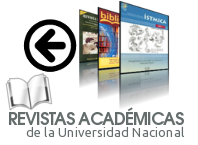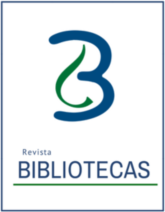The Functional Requirements for Bibliographic Records (FRBR), its Relationship with the GDR and the Changes that lie ahead
DOI:
https://doi.org/10.15359/rb.35-1.1Keywords:
Functional Requirements for Bibliographic Records (FRBR), Resource Description and Acces (RDA), Principles of Paris, Cataloging International PrinciplesAbstract
The field of the information organization is going through an accelerated transformation due to the explotion of the information, to the diversity of support and to the development of the web environments, what has given place to a series of change in the treatment of information. Consequently this investigation pretends to identify what constitutes the model of related identity proposed by the IFLA denominated FRBR (Functional Requirements for Bibliographic Records). What are the Principles of Paris, Cataloging International Principles and in what way influences them in the drafting of the RDA and which are the changes reflected in the RDA (Resources Description & Access) in relation with the AACR2.
References
Azaña, S.C. (2011). RDA: ¿Dar una nueva norma o una nueva concepción de catalogación? V encuentro de catalogadores. México: UNAM.
Calvo, L. (2015). Utilización de herramientas colaborativas para el diseño de una guía didáctica digital para los cursos de procesos técnicos de la Escuela de Bibliotecología y Ciencias de la Información de la Universidad de Costa Rica. Tesis de maestría en Bibliotecología. Universidad de Costa Rica, San José: Costa Rica.
González, E. (2011). RDA: un acercamiento a las nuevas normas de catalogación. Revista Chilena de Bibliotecología (2) 2-14. Chile.
Deborah F. y Richard F. (2016). Rimmf user guide. Recuperado de http://www.marcofquality.com/wiki/rimmf3/doku.php?id=download&nocache
IFLA (2009). Declaración de principios internacionales de catalogación. Recuperado de http://www.ifla.org/files/assets/cataloguing/icp/icp_2009-es.pdf
IFLA (2004). Requisitos Funcionales de los Registros Bibliográficos Informe final. Recuperado de http://www.ifla.org/files/assets/cataloguing/frbr/frbr-es.pdf
Library of Congres (2013). Capacitación LC sobre RDA Recursos: Descripción y Acceso. Recuperado de http://www.loc.gov/catdir/cpso/RDA/RDAcapacitacionLC.html
Library of Congres (2011). Bibliographic Framework Initiative. Recuperado de http://www.loc.gov/bibframe/
Martínez, F. (2009). Las RDA (Resource Description and Access) y su impacto en la catalogación y los catálogos: necesidades de investigación. Recuperado de http://132.248.242.3/~publica/archivos/libros/iv_encuentro_catalogacion.pdf
Piñuela, J. (2002). Epistemología, metodología y técnicas de análisis de contenido. Estudio de sociolingüística, 3 (1) 1-42. Madrid: Universidad Complutense de Madrid.
Reglas de catalogación angloamericanas: Antecedentes y resumen (1978). Trad. G. Escamilla González. México: Conacyt
RDA: Recursos, Descripción y Acceso, (2015). American Library Association. Colombia. Rojas Eberhard Editores.
Vargas, C. y Zamorano, A. (2012). La RDA ¿Mito o realidad?: Panorámica de la catalogación en Chile. Serie Bibliotecología y Gestión de Información, 72. Santiago, Chile: Universidad Tecnológica Metropolitana.
Downloads
Published
How to Cite
Issue
Section
License
Bibliotecas provide immediate open access to their content, based on the principle of facilitating research to the public free of charge and free of charge to promote the global exchange of knowledge.
The journal Bibliotecas is a publication hosted by a public higher education institution, which is supported by public resources. Since its inception, the magazine has offered all its contents free of charge without any restriction on the rights of: reading, downloading and printing in full text. Works published in libraries may be analyzed, quoted and reproduced in whole or in part, mentioning the original source.
The journal Bibliotecas is licensed under the Creative Commons Attribution - Non-Commercial - Share Equal, 4.0 International license; therefore, it is allowed to: share, copy and redistribute the material in any medium or format.

Este obra está bajo una licencia Creative Commons Atribución-NoComercial-CompartirIgual 4.0 Internacional.








